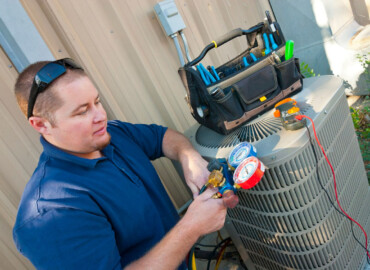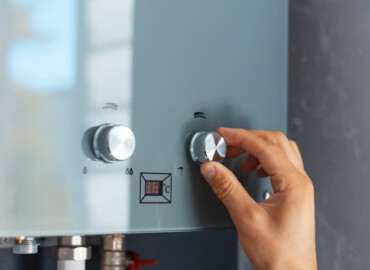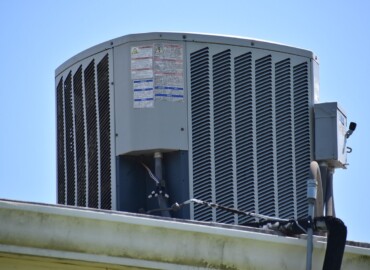5 Tips on How to Prevent Air Conditioner Leaks
Why Are Air Conditioners Important?
Central air conditioners remove hot air, in a house, by drawing it outside and replacing the hot air with cool air, which is then circulated throughout the house. Once the hot air is drawn outside, the outdoor compressor system changes the hot air from gas to liquid. The cooled liquid then passes through an evaporator and cool air is pumped through the house’s ductwork. Air conditioners are important because they have the ability to control indoor temperature as well as humidity. Air conditioners greatly improve the quality of the air, particularly on hot summer days.
If the house does not have a ductwork ventilation system, then a split AC system can be used. The split system is divided into two parts. The outdoor part changes the hot air from gas to cool liquid and the indoor part circulates the cool air. Split systems are beneficial in open-concept houses as they are a zone cooling solution. This differs from central AC systems that are able to cool multiple rooms and levels through ductwork venting. Both central and split units can be easily installed by HVAC service providers.
Most Common Problems with Air Conditioners
Common AC unit problems include; a dirty evaporator, low airflow, and refrigerant leaks.
Dirty Evaporator
The evaporator is responsible for turning the cooled liquid into cool air. This can become compromised by dirt and debris. However, this is quickly solved by cleaning the evaporator.
Low Air Flow
Low airflow is a sign that the AC filter has become dirty or clogged. Air pressure can easily be restored by purchasing a new filter.
Refrigerant Leak
An Air Conditioner leak is the most common air conditioning problem. A refrigerant leak may look like the image below, or it may leak as a gas that is harder to detect. If there is a gas leak, it’s likely that the air pressure and cooling ability of the AC unit will be compromised. Leaks can lead to multiple problems such as; mold damage in the system, rusted coils, and water damage in the walls of the house. The following is a list of simple techniques to prevent Air Conditioner leaks.
5 Tips on How to Prevent Air Conditioner Leaks
Check for Condensate Backup
If the air is dispersing less forcefully than it should, check for condensate backup. Condensate backup can result from a clog in the drain line, causing condensate to overflow. This can easily be fixed during a maintenance repair appointment with an HVAC expert.
If your utility bill has dramatically increased, this could be a sign of a leak or condensate backup. As previously mentioned, a leak can take the form of water or gas. If you notice air pressure decreasing, call an HVAC technician to examine your Air Conditioner unit.
Keep Dogs Away
Keep dogs away from the outdoor AC unit. Dog urine is highly acidic and corrosive. If your dog urinates on the outdoor unit, the acidic urine can damage the refrigerant coils. Dog urine can corrode aluminum and copper. This is why dog crates are made from zinc-plated steel, rather than aluminum. AC coils are typically made from aluminum, copper, or steel and the AC evaporator fins are made from aluminum. Both are susceptible to acidic corrosion. The dog’s urine can also cause metals to rust over time and lead to air conditioner leaks.
Evenly Mount the Drip Pan
Be sure to mount the drip pan evenly, to prevent spillage and condensate backup. Make sure to replace the drip pan every 10 years. If the system is not draining properly, the pan may need to be replaced sooner.
Changing out the drip pan can easily be done following these simple steps.
First, turn off the power to the AC unit. Then remove the hatch covering the coils.
See if the pan is fastened with screws or clips. If there are no visible fasteners, then book an appointment with an HVAC professional. If the drip pan is secured with screws or clips, disconnect the drain line from the pan, and unscrew or unclip the pan.
Lift the pan out while wearing gloves, as there may be mold or mildew on the outer edges of the pan.
Next slide the new pan in, screw it into place, and reconnect the drain line.
Then put the hatch over the coils and turn the power back on.
Yearly HVAC Maintenance
Annual maintenance checks can prevent leaks and catch small leaks while they are still inexpensive to repair. As many natural wear and tear problems can occur, it’s important to have HVAC professionals perform regular checks and repairs on the AC unit.
If the AC system does not undergo regular maintenance, damage can build resulting in rust and mold, and limiting the function of the entire unit. At this point, the whole system may need to be replaced.
Spray Sealants
AC sealants such as AC EasySeal or Flex Seal Rubber Sealant Coating can be used to seal leaks and prevent future leaks. These sealants spray a coating on the drain line to prevent refrigerants from leaking. It’s important to research whether or not a sealant is compatible with the refrigerant in your AC unit before purchasing.
AC sealants should be primarily used as a preventative measure. These seals provide an affordable temporary solution. Note that the sealants are in no way a replacement for professional HVAC service providers. While a leak looks simple enough to fix on the outside, the leak could result from a larger problem within the unit. If a fan is failing to work due to a faulty motor or lack of lubricant, it can lead to poor airflow and problems with the compressor. Once a compressor has failed, the whole air conditioner may need to be replaced. Fixing a leak with a sealant won’t fix the fan or the compressor.
It’s important to consult an HVAC technician before performing any at-home repairs.



